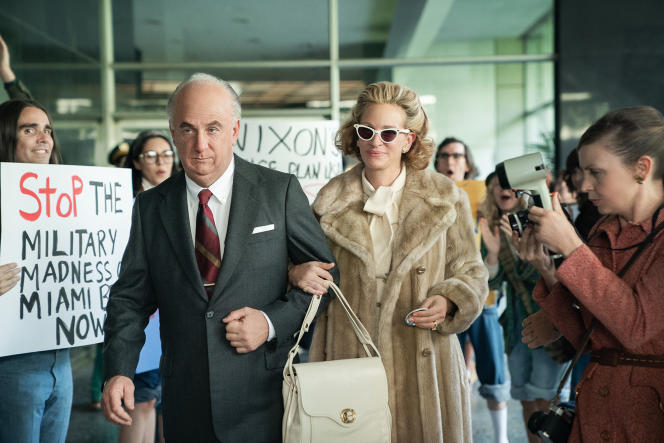On June 17, 1972, a team of broken arms led by a former FBI agent, G. Gordon Liddy (Shea Whigham), broke into, by order of the White House, the headquarters of the Democratic Party, in the Watergate building in Washington, before being arrested thanks to the presence of mind of a night watchman, Frank Wills (Patrick Walker). Two years later, the Republican President of the United States, Richard Nixon, had resigned and those of his collaborators who had organized or participated in the burglary were behind bars or on their way to a federal penitentiary.
The sequence of Watergate events has been chronicled in great detail. The only remaining uncertainty concerns the purpose of the burglary. What did Liddy and his men—lost soldiers of the anti-Castro cause—hope to find that would serve the Republican cause as Nixon pranced far ahead in the polls?
Gaslit does not provide the answer to this question, which is altogether secondary. It is rather a question of giving flesh to what has remained in memory as the prototype of a (self) destructive political mechanism by focusing on the impact of the scandal on the lives of a few characters, excluding the better known (we will therefore see neither Richard Nixon nor the Washington Post journalists who revealed the affair, Bob Woodward and Carl Bernstein).
Gaslit has selected a handful of characters to feed this chopper whose reputations and existences come out crushed: Martha Mitchell (Julia Roberts), the wife of John Mitchell (Sean Penn), ex-Attorney General of the United States who became chairman of the committee for Nixon’s re-election, John Dean, the handsome young presidential lawyer (Dan Stevens) and his wife Maureen (Betty Gilpin), G. Gordon Liddy and Frank Wills.
Melodrama and burlesque satire
The result is a fragmented series, which goes from gothic melodrama (the Mitchell couple) to burlesque satire of military machismo (Liddy), passing through a striking portrait of the hedonism of the American male (John Dean), which irresistibly evokes Mad Men, and a brief but striking evocation of the African-American community in the Federal District (Frank Wills).
This mosaic draws a historical moment that strangely resembles the one the United States is going through today. Fascinating figures appear, starting with that of Martha Mitchell, who was one of the first to perceive the scope of the burglary, and whom her husband had sequestered to prevent her from speaking to the press. Julia Roberts brilliantly reconciles the narcissism of her character and her rejection of the rules of the game, political and patriarchal. Shea Whigham paints a deliberately grotesque portrait of G. Gordon Liddy (who would later transition successfully into the celebrity industry), while it’s up to the Dean couple and Frank Wills to inspire some sympathy.
If the atmosphere of quasi-civil war that bathes Gaslit resembles that which reigns today in Washington, a difference is obvious. Where Martha Mitchell, John Dean and a few others decided to risk their reputations and their freedom to help justice establish the truth, there is today no one in the Republican camp to contribute to the investigation opened after the assault on the Capitol, in February 2021.


















